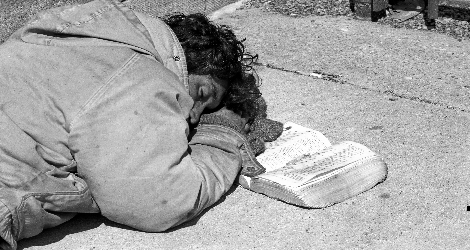Ownership: A Necessary Digression
The Bible does recognize the legitimacy of private ownership. Otherwise what would be the significance of “thou shall not steal” or of Jesus’ words to the rich man in Mark 10:21 (RSV)—“Go, sell all you have and give to the poor”? But the Bible always speaks of possession in the larger context of responsibility to God and to community. According to the Bible, what belongs to the individual belonged first to God and does not cease to belong to God. Stewardship rather than ownership is the primal category. Human beings are blessed, not for our own sakes, but in order to contribute to the common good, to bless others. That is perhaps why, implicit in the biblical narrative, there are limits to the accumulation of wealth.[4] An entry in A Companion to the Bible offers this explanation of the Biblical viewpoint: “The condition of the misery of any of God’s children is not acceptable to God. On the contrary, God wishes it to cease, and that is why God forbids the accumulation of possessions in the hands of the rich. That accumulation announces the ruin of the rich person, who puts his confidence not in God, but in the accumulation of riches themselves.”[5]
According to Walter Owensby’s summary of the biblical view of wealth,
Material goods are not evil but rather the good gifts of God for all humankind. Evil arises when what God intends to be shared in common is seized by the few for their own power and privilege. Ownership, instead, should be determined by need and by the ability to use resources appropriately—that is, in meeting the need of others. The concentration of wealth through inheritance is denounced. Not even labor power expended gives absolute property rights to the individual, since the resources with which labor is mixed are the gifts of God. God does not abandon a prior claim, and thus Christian faith can honor no absolute, individual right to private property.[6]
There is simply, “Nothing in the biblical tradition that even remotely accepts the concept of the right of the individual to acquire any quantity of goods or wealth in blind indifference to the condition and needs of others,” or for that matter, in blind indifference to the fruits that help us to recognize that a human soul is on the God-enabled journey toward perfection.
Nor does the biblical tradition exhibit any inclination to trust in the good will of individuals or in supposedly automatic mechanisms (e.g. invisible hands or trickle-down theories) to achieve a God-envisioned economy of justice in which the needs of all are met. The voice of the prophets and of the early church fathers is avowedly interventionist in economic affairs.[7]
Though it is true that Biblical faith acknowledges the reality of individual property rights and the individual right to decide what to do with property, that right is understood only within the context of a stewardship ethic that regards the whole of creation as God’s capital on loan to each generation to meet the needs of all of God’s people. It is, therefore, in conflict with our Christian faith to assume that capital owners should have perfect autonomy to decide for themselves what constitutes a “good” use for their resources without considering the maximization not only of their own welfare and/or that of their shareholders, but also of those who labor on their behalf, the community from which the laborers come, and the physical creation which sustains them both.









I regret to say that I find Reverend Owen’s article frustrating. It would have been helped if she had started with a definition of capitalism. An acknowledgement of different types of capitalism would have clarified that her real beef is with totally laissez faire markets. One could then ask whether this is the political-economy we have, or whether it is an ideology vying to reshape our common life. This would have strengthened her argument which seems more oriented to reforming capitalism rather than replacing it with some other economic system.
She names Max Stackhouse as a defender laissez faire. She can only do this because she seems to have no idea what he affirmed or why. The choice, Stackhouse says, is between locating the economy in the family, the state, or the social space between them that had been carved out by the church – corporations. Separating the economy from the state allows states to engage in the sort of regulation she suggests in her conclusion.
Her characterization of is also unfair because Stackhouse brings considerable theological and ethical resources to bear to critique and humanize capitalism. Indeed, this is the church’s vocation! Engagement with his ideas would have clarified Owen’s muddle on the relationship between economics and theology. In all of this his is closer to a “New Deal” affirmation of capitalism than laissez faire. And so is she!